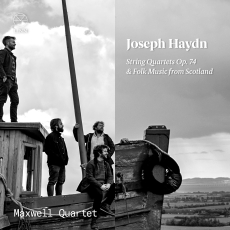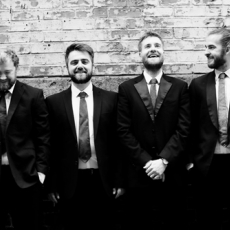Maxwell Quartet - Haydn: String Quartets Op. 74 - Folk Music from Scotland - American Record Guide
The Maxwells are four young, burly, bearded Scotsmen, with tastes both for Haydn and for the Scottish fiddle tradition. To judge by what I hear here, they are among the best Haydn quartets now playing anywhere. I listened to this disc, and immediately went online and ordered its predecessor (Op. 71, with three more Scottish sets—July/Aug 2019), which proved to be just as good. Opp. 71 and 74 are two sets of three quartets, issued simultaneously, so in effect the standard opus-worth’s of six. They are, despite their late date and their avowedly “public” mien, rather underplayed Haydn, apart of course from the justly celebrated Rider, Op. 74:3. By the standard of preceding sets, these are relatively “notey” works, with much bustle in them; there is also a slight but perceptible expansion of the time-frame. Both these qualities have to do with the strikingly public performance atmosphere of the premieres, which took place at Johann Peter Salomon’s concert series in London. For the same reason, all six of them start with a “noise-killer”, a brief (from a single chord to a few bars) opening gesture meant partly to shut the large, packed audience up. The Maxwells approach Op. 74 in a manner calculated both to play to such an audience and also to repay minute attention; theirs is a public yet still rarefied art. The dominant impression of their sound is a combination of lightness and pungency. The lines are long, lithe, and airy, and at the same time each individual bowstroke has some kick in it; everything is deftly punctuated, subtly and sharply graven with little bow chiffs. Combine this with a meticulous attention to the weighting and balance of lines, and you have Haydn that never bogs down and also never feels rushed, Haydn whose mode of being is a kind of innocently mirthful naturalness. It scampers nimbly, it reposes gravely, but there is nothing at all that doesn’t feel perfectly right. (Even the ornaments: It’s almost always dangerous to embellish Haydn, especially as he sometimes does so himself, but here the handful of ventures in that direction seem apt, light, and fleeting. Of the usual clumsy style I’ve taken to calling Stupid Ornament Disease, there’s nary a trace.) In the C-major Quartet 1, the spaciousness of the long first movement is striking, as are what the Maxwells (correctly, I think) discern as tributes to the recently-deceased Mozart in the style of both the slow movement and the Minuet’s idyllic, almost Schubertian trio, unexpectedly in A major. Quartet 2, in F, includes an unusually intricate variation-set as slow movement and another third-related Trio in the Minuet, this one in D-flat. The finale bounds joyously through a bevy of obstacles great and small, including (near the end) a sudden halt where low, quiet chords alternate with high, loud ones. The Rider, which is the only one of the six in a minor key (one per set was typical for Haydn), is named for the galloping motion of its finale, but perhaps best known for its slow movement, a hymn in far-off E major that prefigures several more such movements in Opp. 76 and 77. After a brief section in the minor, the hymn returns, now with quasi-Romany embellishments from the first violin; a remote, unexpected, pianissimo chord in the original recurs this time in tremolo. At least, here it’s in tremolo; in every other performance I know, it’s in measured 32nd notes, but the trembling quality and the almost- inaudible dynamic suggest awe here, even momentary terror. (The quartet’s violist tells me via email that, yes, there was discussion about how to play this, and they settled on the tremolo for that uncanny effect.) The Rider finale goes like the wind, the first violin effortlessly nailing the high-flying lines. Here there are plausible contending performances, including the early Alban Berg Quartet on Teldec (hard to find now, except in large boxes) and the Hagen Quartet on DG, but this is as good as either, and I can’t think of anyone to top the Maxwells in the other two quartets, not even my beloved Endellions (Virgin). The Scottish sets, one following each quartet, are terrific, combining slow songs like `Coilsfield House’ with fast strathspeys and reels like `Miss Gordon of Gight’. The alternation can feel a bit odd, especially after the triumphant Rider finale, where I for one almost forgot there was anything else on the disc, but the arrangements and the playing are both spectacular. (They aren’t published, as yet, but plans are in the works.) They will be tricky for other ensembles to learn—a lot of tiny, deft ornaments, much unison playing between the violins, very little vibrato—but also valuable: you can see here how the Maxwells have honed both their intonation and their ornamentation. Linn’s sound is, as ever, spectacularly clear. More, please! Would I like to hear these guys in Op. 64, or Op. 76, or Op. 77? Why, yes. Yes, I would.

